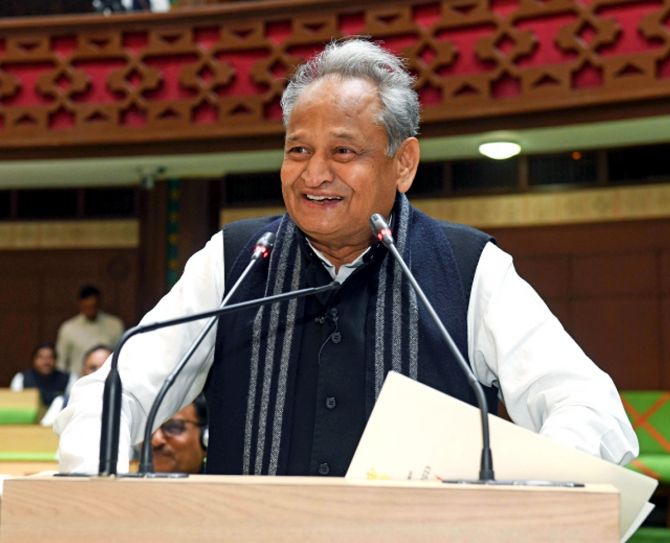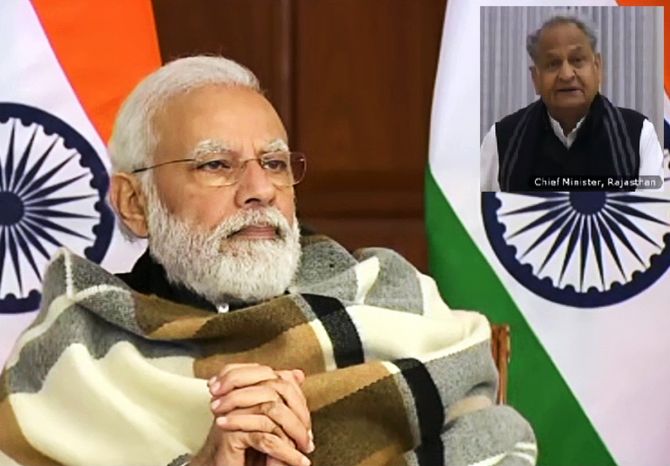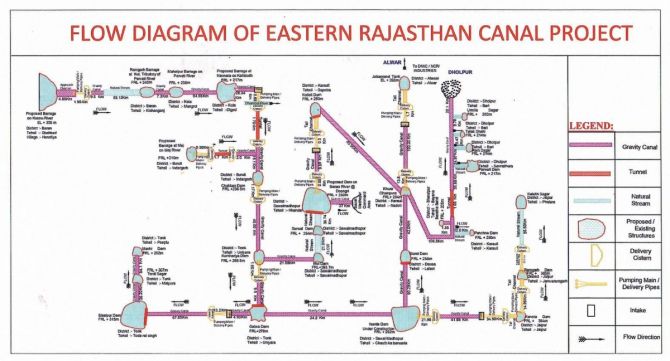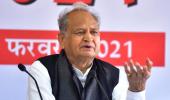Rajasthan Chief Minister Ashok Gehlot is determined to implement the Eastern Rajasthan Canal Project despite the Centre's indifference.
Prakash Bhandari reports.

Rajasthan's Chief Minister Ashok Gehlot is known for writing letters to Prime Minister Narendra Modi.
Such letters are always objective and deal with various issues relates to his state or the country as a whole.
Often, he raises issues about the rights of states under a federal structure. And these letters often create ripples in the prime minister's office.
Only a few letters are replied to; the rest are filed away after being marked as 'Received'.
By raising issues that benefit various states, Gehlot has earned the goodwill of his fellow chief ministers, particularly those from non-BJP states.
He is admired by M K Stalin, the chief minister of Tamil Nadu, who calls him the 'voice of non-BJP states'.
Prior to the Union Budget, Gehlot wrote to the prime minister, urging him to consider Rajasthan's proposal to build the ambitious Eastern Rajasthan Canal Project (ERCP) to quench the thirst of its people.
This mega-project that aims to transfer surplus water from the Chambal river basin to the Banas, Morel, Banganga, Kali Sindh, Gambhir and Parbati river sub-basins by connecting the 11 rivers of eastern Rajasthan.
After the interlinking of these small rivers, 13 districts -- Jhalawar, Baran, Kota, Bundi, Sawai Madhopur, Ajmer, Tonk, Jaipur, Dausa, Karauli, Alwar, Bharatpur and Dholpur -- will not only get drinking water but also water for irrigation.
The ERCP will augment the yield in 26 major and medium irrigation projects and will rejuvenate 80,000 hectares of existing irrigation command areas (irrigation command refers to those agricultural areas that are irrigated by artificial sources of water). It also proposes to bring an additional 200,000 hectares under irrigation command.
This will transform agricultural practices, thus bringing about a massive change in living standards of the people of eastern Rajasthan.
Kindly click on the image for a better look:
According to the Gehlot government, this project would have resolved the drinking water and agricultural water needs of the people of these 13 districts -- a problem they have been grappling with for almost half a century.
A detailed report -- which estimated the cost of the project at Rs 37,247 crores (Rs 372.47 billion); the state will find it difficult to carry out this project without Union Budgetary support -- had been sent to the Centre for its consideration in 2017.
Looking at the cost of the project, Gehlot had, in 2020, demanded the ERCP be declared a national project.
The funding pattern for any project with a national status is 90:10, with 90 per cent of the funds coming from the Centre; the ERCP, which is not a national project, will be funded 60 per cent by the Centre and 40 per cent by the state, said a senior Rajasthan official.
Gehlot believes that the ECRP deserves to be declared a national project as, when completed, it will also cater to the water needs of the industrial units to be set up under the ambitious Japanese-aided Delhi-Mumbai Industrial Corridor. A large part of the DMIC falls within Rajasthan.
Under the ERCP, the main canal and its feeder canals would be spread across 1,268 km, of which the gravity feeder (which uses gravity to encourage the flow of water) would be spread across 965 km; the natural stream would be 158 km long.
What is interesting is that the project -- initially prepared by the Gehlot government -- was subsequently taken up by Vasundhara Raje's then Bharatiya Janata Party government which, in 2017, submitted a plan to the Central Water Commission.
A high-level meeting of the Jal Shakti ministry discussed the project at its meeting in January this year before the Budget. While the Budget has been presented, the project continues to await the Union government's approval.

Rajasthan is the biggest state of the country in terms of area, but a large part of it is a desert.
In all, Gehlot has written 15 letters to Modi, asking that the ERCP be granted budgetary support.
In his letters, the chief minister reminded the prime minister of his commitment to the project at two election-related public rallies that he addressed in Rajasthan on July 7, 2018, and October 6, 2018; at these rallies, Modi spoke about the ERCP's importance and promised to ensure its implementation.
But the Union Cabinet, instead of approving the ERCP, sanctioned the interlinking of the Ken-Betwa rivers at a cost of Rs 44,600 crores (Rs 446 billion) -- a project that is more expensive than the ERCP. This project will help 13 districts in BJP-ruled Madhya Pradesh and Uttar Pradesh.
Gehlot, while lobbying for the ERCP, had requested the state's 25 MPs, who are from the BJP, to keep the state's interests in mind and pressurise the Centre to approve this ambitious project.
However, when it failed to get any support in the Union Budget, Gehlot came down heavily on the state's MPs. He said they have disappointed Rajasthan by failing to get any mega benefit for the state; they have also not been able to impress upon the Union government the utility and benefits of the Eastern Rajasthan canal project.
Gehlot has continued to keep the spotlight in the issue, even raising it during a meeting with the NITI Aayog in the prime minister's presence. The chief minister explained that while Rajasthan has 10 per cent of the country's land, it has access to only one per cent of the country's water.
Since Rajasthan is mainly a desert region, there is shortage of surface and groundwater. Due to the large distance between village hamlets as well as the heterogeneous geographical conditions, the cost of providing drinking water to every house is much higher than in other states.
In view of this, Gehlot believes, the central government should -- like it does for the hill states -- provide 90:10 assistance under the Jal Jeevan Mission to the state.
In a recent letter to the Jal Shakti ministry, Rajasthan's water resources department pointed out that the status of national project has been given to 16 projects in other states, but no project in Rajasthan has been given this status.
After failing in his efforts to get a Union Budget sanction, Gehlot has said the state government will now try and complete the ERCP with its own resources and has announced a budgetary sanction of Rs 9,600 crores (Rs 96 billion).
A separate corporation would be set up to undertake the gigantic task of building this canal which Gehlot described as a 'Bhagirathi Prayas'.
'After failing to get any support from the Union government, we have taken a mammoth initiative to kickstart this project which has now become the aspiration of the people of Rajasthan,' the chief minister said.
'The whole project can be implemented through a special purpose vehicle. The SPV will be used as a platform to generate extra budgetary resources. This exercise will help the state government overcome financial constraints and provide a sufficient fund flow,' he explained.
It is estimated that the completion cost of the project is Rs 40,000 crores (Rs 400 billion). If Gehlot pulls it off, the ERCP will become an example of how states need not look at the Centre to achieve their dreams.
Feature Presentation: Rajesh Alva/Rediff.com











